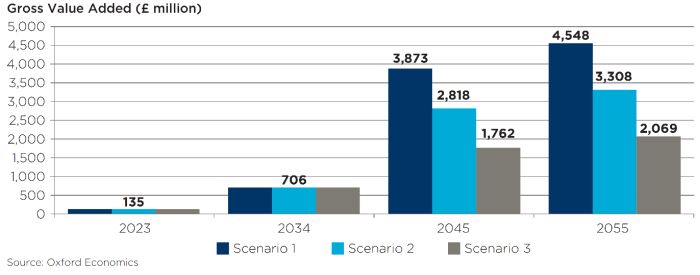- with readers working within the Pharmaceuticals & BioTech industries
It is very hard to predict, especially the future. The adage, sometimes attributed to Niels Bohr, is always worth bearing in mind when forecasting the uptake of new technologies. A recent report from Oxford Economics however does an admirable job in mitigating the uncertainties to provide a breakdown of its view of the future significance of the quantum computing industry to the UK economy.
The analysis in the report divides the growth of the quantum computing industry into 3 phases:
- Scoping and R&D;
- Quantum technology reaches maturity and becomes commercially viable; and
- Industry's full-adoption of quantum computing
Phase 1 has been forecast drawing an analogy with the growth trajectory of the artificial intelligence market in the US "to reflect the growth of a rapidly evolving field which has made large technological breakthroughs". The forecast of phase 2 is similarly tied to the growth of mainframe computing systems between 1960 and 1971 owing to that period being when mainframes transitioned into full operation across many sectors. Phase 3, relating to full maturation, is forecast with a view to high-tech goods output in the decade from 2013.
It is phase 2 which is of particular interest, with its analysis further broken down into 3 scenarios respectively assuming that quantum computing grows at 75%, 50% and 25% of the rate of growth of mainframe computing systems.

Oxford Economics predicts gross value added1 directly from quantum computing to the UK economy to range from nearly £3.9 to £1.8 billion by 2045. Including the impact of the quantum computing industry on its UK supply chain and on wage payments in other parts of the economy, the Oxford Economics report paints an even rosier picture.
The 2045 time horizon is a significant one for patent professionals, as it represents the date a patent filed today would expire. The above data show that the UK quantum computing industry will grow sizeably throughout the lifetime of such a notional patent. This suggests that there is a significant advantage for individuals and businesses to file quantum computing patents now to secure their part of a lucrative market.
We can help you protect your quantum computing innovations
Our patent attorneys can provide you with support on an individual basis, thanks to their inter-disciplinary expertise in computer science, physics, and communication engineering. We will work with you to identify the most promising concepts from your area of development, devise strategies to protect them and provide all necessary support from patent filing, through patent issuance and beyond.
Oxford Economics predicts gross value added1 directly from quantum computing to the UK economy to range from nearly £3.9 to £1.8 billion by 2045. Including the impact of the quantum computing industry on its UK supply chain and on wage payments in other parts of the economy, the Oxford Economics report paints an even rosier picture.
The 2045 time horizon is a significant one for patent professionals, as it represents the date a patent filed today would expire. The above data show that the UK quantum computing industry will grow sizeably throughout the lifetime of such a notional patent. This suggests that there is a significant advantage for individuals and businesses to file quantum computing patents now to secure their part of a lucrative market.
We can help you protect your quantum computing innovations
Our patent attorneys can provide you with support on an individual basis, thanks to their inter-disciplinary expertise in computer science, physics, and communication engineering. We will work with you to identify the most promising concepts from your area of development, devise strategies to protect them and provide all necessary support from patent filing, through patent issuance and beyond.
Footnote
1. Gross value added is the contribution each form or sector makes to UK GDP
The content of this article is intended to provide a general guide to the subject matter. Specialist advice should be sought about your specific circumstances.


